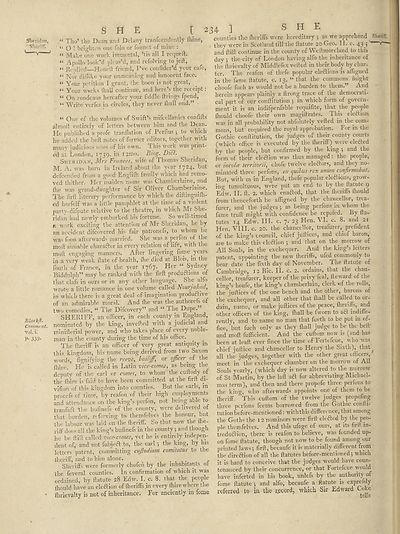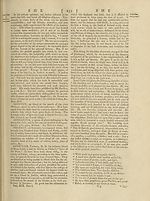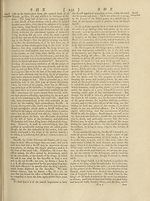Encyclopaedia Britannica, or, a Dictionary of arts, sciences, and miscellaneous literature : enlarged and improved. Illustrated with nearly six hundred engravings > Volume 19, Scripture-SUG
(252) Page 234
Download files
Complete book:
Individual page:
Thumbnail gallery: Grid view | List view

Sheridan,
' Sheriff.
Blackjl.
Comment.
vol. i.
P- 33^-
SHE [
“ Tho’ the Dean and Delany tranfeendfcntly dune,
“ O ! brighten one folo or lonnet of mine :
“ Make one work immortal, ’tis all I requeft.
“ Apollo look’d pleas’d, and refolving to jeft,
“ Replied—Honeft friend, I’ve confider’d your cafe,
“ Nor dillike your unmeaning and innocent face.
“ Your petition I grant, the boon is not great,
“ Your works fhall continue, and here’s the receipt:
“ On rondeaus hereafter your fiddle-firings fpend,
“ Write verfes in circles, they never fhall end.”
“ One of the volumes of Swift’s mifcellanies confifls
aim oft entirely of letters between him and the Dean.
He publifired a profe tranflation of Perfius •, to which
he added the belt notes of former editors, together with
many judicious ones of his own. Lifts work was print¬
ed at London, 1739, in i2mo. Biog. DiB.
Sheridan, Mrs Frances, wife of I homas Sheridan,
M. A. was born in Ireland about dre year 1724, but
defcended from a good Englifh family which had remo¬
ved thither. Her maiden name was Chamberlaine, and
fhe was grand-daughter of Sir Oliver Chamberlaine.
The firft literary performance by which fhe diftinguifh-
ed herfelf was a little pamphlet at the time of a violent
party-difpute relative to the theatre, in which Mr She¬
ridan had newly embarked his fortune. So well-timed
a work exciting the attention of Mr Sheridan, he by
an accident difcovered his fair patronefs, to whom he
was foon afterwards married. She ^vas a perfon of the
moft amiable ehara&er in every relation of life, with the
moft engaging manners. After lingering feme years
in a very weak ftate of health, (he died at Blois, in the
foulh of France, in the year 1767. Her “ Sydney
Biddulph” may be ranked with the firft produ&ions of
that elafs in ours or in any other language. She alfo
wrote a little romance in one volume called Nourjahad,
in which there is a great deal of imagination productive
of an admirable moral. And fire was the authorefs of
two comedies, “ The Difcovery” and “ I he Dupe.
SHERIFF, an officer, in each county in England,
nominated by the king, invefled with a judicial and
minifterial power, and who takes place of every noble¬
man in the county during the time of his office.
The ftreriff is an officer of very great antiquity in
this kingdom, his name being derived from two Saxon
words, fignifying the reeve, bailiff, or officer the
flftre. He is called in Latin vice-come^, as being the
deputy of the earl or comes, to whom the cuftody of
the ffiire is faid to have been committed at the firft di-
vifion of this kingdom into counties. _ But the earls, m
procefs of time, by reafon of their high employments
and attendance on the king’s perfon, not being able to
tranfaft the bufinefs of the county, were delivered of
that burden, referving to themfelves the honour, but
the labour wras laid on the fheriff. So that now the fhe-
riff does all the king’s bufinefs in the county; and though
he be ft ill called vice-comes, yet he is entirely indepen¬
dent of, and not fubjeft to, the earl •, the king, by his
letters patent, committing cujlodiam comitatus to the
Iheriff, and to him alone.
Sheriffs were formerly chofen by the inhabitants of
the feveral counties. In confirmation of which it was
ordained, by ftatute 28 Edw. I. c. 8. that the people
fihould have an eleftion of fheriffs in every ffiire where the
Shrievalty is not of inheritance. For anciently in feme
234 1 she
counties the ffieriffs were hereditary 5 as we apprehend Sheriff,
they w7ere in Scotland till the ftatute 20 Geo. II. c. 43 j v~“
and ft ill continue in the county of Weftmoreland to this
day ; the city of London having alfo the inheritance of
the fhrievalty of Middlefex veiled in their body by char¬
ter. The reafon of thefe popular eledions is affigned
in the fame ftatute, c. 13. “ that the commons might
choofe fuch as would not be a burden to them.” And
herein appears plainly a ftrong trace of the democrati-
cal part of our conftitution ; in which form of govern¬
ment it is an indifpenfable requifite, that the people
fhould choofe their own magiftrates. I his eletlion
Avas in all probability not abfolutely veiled in the com¬
mons, but required the royal approbation. Tor in the
Gothic conftitution, the judges of their county courts
(which office is executed by the fheriff) weie eledled
by the people, but confirmed by the king ; and the
form of their ele&ion was thus managed : the- people,
or incolce territoru, ehofe twelve electors, and they no¬
minated three perfons, ex quibus rex unum confii mabat.
But, with us in England, thefe popular eleibions, grow¬
ing tumultuous, Were put an end to by the ftatute 9
Edw. II. ft. 2. which ena&ed, that the fheriffs fhould
from thenceforth be affigned by the chancellor, trea-
furer, and the judges } as being perfons in whom the
fame truft might with confidence be repofed. By fta-
tutes 14 Edw. III. c. 7. 23 Hen. VI. c. 8. and 21
Hen. VIII. c. 20. the chancellor, treafurer,. prefident
of the king’s council, chief juflices, and chief baron,
are to make this eleflion j and that on the morrow of
All Souls, in the exchequer. And the king s letters
patent, appointing the new fheriffs, ufed commonly to
bear date the fixth day of November. The ftatute of
Cambridge, 12 Ric. II. c. 2. ordains, that the chan¬
cellor, treafurer, keeper of the privy feal, ftevard of the
king’s houfe, the king’s chamberlain, clerk of the rolls,
the juftices of the one bench and the other, baions of
the exchequer, and all other that fhall be called to or¬
dain, name, or make juftices of the peace, fheiifts, aijd
other officers of the king, fhall be fworn to aft indiffe¬
rently, and to name no man that fueth to be put in of¬
fice, but fuch only as they fhall judge to be the beft
and moft fufficient. And the cuftom now is (and has
been at leaft ever fince the time of Fortefcue, who was
chief juftice and chancellor to Henry the Sixth), that ^
all the judges, together with the other great officers,
meet in the exchequer chamber on the morrow of All
Souls yearly, (which day is now altered to the moirow
of St Martin, by the laft aft for abbreviating Michael¬
mas term), and then and there propofe three perfons to
the king, who afterwards appoints one of them to be
fheriff This cuftom of the twelve judges propofing
three perfons feems borrowed from the Gothic confti¬
tution before-mentioned : with this difference, that among
the Goths the x 2 nominors were firft elefted by the peo¬
ple themfelves. And this ufage of ours, at its firft in-
troduaion, there is reafon to believe, was founded up¬
on feme ftatute, though not now to be found among our
printed law's} firft, becaufe it is materially different from
the direftion of all the ftatutes before-mentioned-, which
it is hard to conceive that the judges would have coun¬
tenanced by their concurrence, or that Fortefcue would
have inferted in his book, unlefs by the authority of
fome ftatute j and alfo, becaufe a ftatute is exprefsly
referred to in the rjecord, which Sir Edward Coke
I
P
' Sheriff.
Blackjl.
Comment.
vol. i.
P- 33^-
SHE [
“ Tho’ the Dean and Delany tranfeendfcntly dune,
“ O ! brighten one folo or lonnet of mine :
“ Make one work immortal, ’tis all I requeft.
“ Apollo look’d pleas’d, and refolving to jeft,
“ Replied—Honeft friend, I’ve confider’d your cafe,
“ Nor dillike your unmeaning and innocent face.
“ Your petition I grant, the boon is not great,
“ Your works fhall continue, and here’s the receipt:
“ On rondeaus hereafter your fiddle-firings fpend,
“ Write verfes in circles, they never fhall end.”
“ One of the volumes of Swift’s mifcellanies confifls
aim oft entirely of letters between him and the Dean.
He publifired a profe tranflation of Perfius •, to which
he added the belt notes of former editors, together with
many judicious ones of his own. Lifts work was print¬
ed at London, 1739, in i2mo. Biog. DiB.
Sheridan, Mrs Frances, wife of I homas Sheridan,
M. A. was born in Ireland about dre year 1724, but
defcended from a good Englifh family which had remo¬
ved thither. Her maiden name was Chamberlaine, and
fhe was grand-daughter of Sir Oliver Chamberlaine.
The firft literary performance by which fhe diftinguifh-
ed herfelf was a little pamphlet at the time of a violent
party-difpute relative to the theatre, in which Mr She¬
ridan had newly embarked his fortune. So well-timed
a work exciting the attention of Mr Sheridan, he by
an accident difcovered his fair patronefs, to whom he
was foon afterwards married. She ^vas a perfon of the
moft amiable ehara&er in every relation of life, with the
moft engaging manners. After lingering feme years
in a very weak ftate of health, (he died at Blois, in the
foulh of France, in the year 1767. Her “ Sydney
Biddulph” may be ranked with the firft produ&ions of
that elafs in ours or in any other language. She alfo
wrote a little romance in one volume called Nourjahad,
in which there is a great deal of imagination productive
of an admirable moral. And fire was the authorefs of
two comedies, “ The Difcovery” and “ I he Dupe.
SHERIFF, an officer, in each county in England,
nominated by the king, invefled with a judicial and
minifterial power, and who takes place of every noble¬
man in the county during the time of his office.
The ftreriff is an officer of very great antiquity in
this kingdom, his name being derived from two Saxon
words, fignifying the reeve, bailiff, or officer the
flftre. He is called in Latin vice-come^, as being the
deputy of the earl or comes, to whom the cuftody of
the ffiire is faid to have been committed at the firft di-
vifion of this kingdom into counties. _ But the earls, m
procefs of time, by reafon of their high employments
and attendance on the king’s perfon, not being able to
tranfaft the bufinefs of the county, were delivered of
that burden, referving to themfelves the honour, but
the labour wras laid on the fheriff. So that now the fhe-
riff does all the king’s bufinefs in the county; and though
he be ft ill called vice-comes, yet he is entirely indepen¬
dent of, and not fubjeft to, the earl •, the king, by his
letters patent, committing cujlodiam comitatus to the
Iheriff, and to him alone.
Sheriffs were formerly chofen by the inhabitants of
the feveral counties. In confirmation of which it was
ordained, by ftatute 28 Edw. I. c. 8. that the people
fihould have an eleftion of fheriffs in every ffiire where the
Shrievalty is not of inheritance. For anciently in feme
234 1 she
counties the ffieriffs were hereditary 5 as we apprehend Sheriff,
they w7ere in Scotland till the ftatute 20 Geo. II. c. 43 j v~“
and ft ill continue in the county of Weftmoreland to this
day ; the city of London having alfo the inheritance of
the fhrievalty of Middlefex veiled in their body by char¬
ter. The reafon of thefe popular eledions is affigned
in the fame ftatute, c. 13. “ that the commons might
choofe fuch as would not be a burden to them.” And
herein appears plainly a ftrong trace of the democrati-
cal part of our conftitution ; in which form of govern¬
ment it is an indifpenfable requifite, that the people
fhould choofe their own magiftrates. I his eletlion
Avas in all probability not abfolutely veiled in the com¬
mons, but required the royal approbation. Tor in the
Gothic conftitution, the judges of their county courts
(which office is executed by the fheriff) weie eledled
by the people, but confirmed by the king ; and the
form of their ele&ion was thus managed : the- people,
or incolce territoru, ehofe twelve electors, and they no¬
minated three perfons, ex quibus rex unum confii mabat.
But, with us in England, thefe popular eleibions, grow¬
ing tumultuous, Were put an end to by the ftatute 9
Edw. II. ft. 2. which ena&ed, that the fheriffs fhould
from thenceforth be affigned by the chancellor, trea-
furer, and the judges } as being perfons in whom the
fame truft might with confidence be repofed. By fta-
tutes 14 Edw. III. c. 7. 23 Hen. VI. c. 8. and 21
Hen. VIII. c. 20. the chancellor, treafurer,. prefident
of the king’s council, chief juflices, and chief baron,
are to make this eleflion j and that on the morrow of
All Souls, in the exchequer. And the king s letters
patent, appointing the new fheriffs, ufed commonly to
bear date the fixth day of November. The ftatute of
Cambridge, 12 Ric. II. c. 2. ordains, that the chan¬
cellor, treafurer, keeper of the privy feal, ftevard of the
king’s houfe, the king’s chamberlain, clerk of the rolls,
the juftices of the one bench and the other, baions of
the exchequer, and all other that fhall be called to or¬
dain, name, or make juftices of the peace, fheiifts, aijd
other officers of the king, fhall be fworn to aft indiffe¬
rently, and to name no man that fueth to be put in of¬
fice, but fuch only as they fhall judge to be the beft
and moft fufficient. And the cuftom now is (and has
been at leaft ever fince the time of Fortefcue, who was
chief juftice and chancellor to Henry the Sixth), that ^
all the judges, together with the other great officers,
meet in the exchequer chamber on the morrow of All
Souls yearly, (which day is now altered to the moirow
of St Martin, by the laft aft for abbreviating Michael¬
mas term), and then and there propofe three perfons to
the king, who afterwards appoints one of them to be
fheriff This cuftom of the twelve judges propofing
three perfons feems borrowed from the Gothic confti¬
tution before-mentioned : with this difference, that among
the Goths the x 2 nominors were firft elefted by the peo¬
ple themfelves. And this ufage of ours, at its firft in-
troduaion, there is reafon to believe, was founded up¬
on feme ftatute, though not now to be found among our
printed law's} firft, becaufe it is materially different from
the direftion of all the ftatutes before-mentioned-, which
it is hard to conceive that the judges would have coun¬
tenanced by their concurrence, or that Fortefcue would
have inferted in his book, unlefs by the authority of
fome ftatute j and alfo, becaufe a ftatute is exprefsly
referred to in the rjecord, which Sir Edward Coke
I
P
Set display mode to:
![]() Universal Viewer |
Universal Viewer | ![]() Mirador |
Large image | Transcription
Mirador |
Large image | Transcription
Images and transcriptions on this page, including medium image downloads, may be used under the Creative Commons Attribution 4.0 International Licence unless otherwise stated. ![]()
| Permanent URL | https://digital.nls.uk/192698558 |
|---|
| Attribution and copyright: |
|
|---|
| Description | Ten editions of 'Encyclopaedia Britannica', issued from 1768-1903, in 231 volumes. Originally issued in 100 weekly parts (3 volumes) between 1768 and 1771 by publishers: Colin Macfarquhar and Andrew Bell (Edinburgh); editor: William Smellie: engraver: Andrew Bell. Expanded editions in the 19th century featured more volumes and contributions from leading experts in their fields. Managed and published in Edinburgh up to the 9th edition (25 volumes, from 1875-1889); the 10th edition (1902-1903) re-issued the 9th edition, with 11 supplementary volumes. |
|---|---|
| Additional NLS resources: |
|

